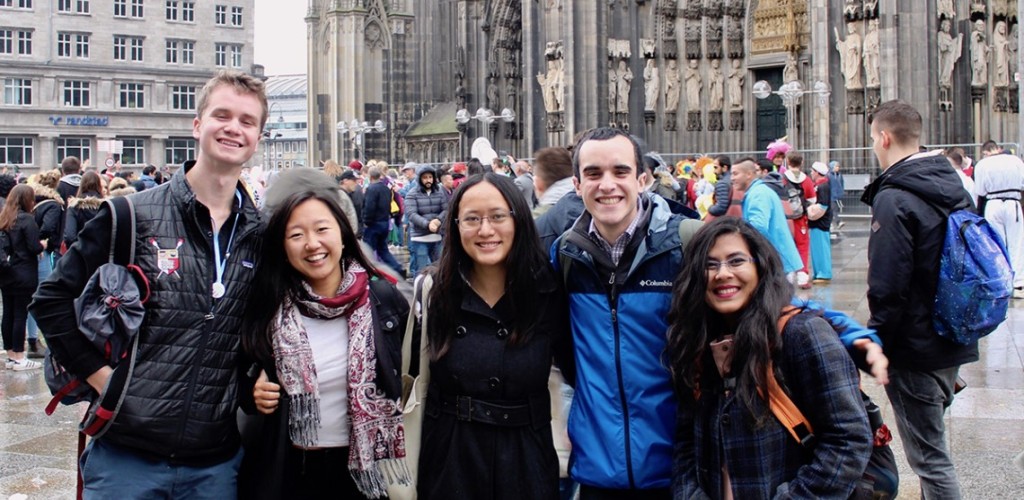For the first week of 2017’s Conference of the Parties (COP23) in Bonn, Germany, Nov. 6-17 – the annual global United Nations negotiations where countries grapple with climate change – seven Cornell students seized a rare opportunity to mingle with key figures from leading non-governmental organizations, businesses and governments around the world.
Cornell was one the few U.S. universities with a large formal presence, said Michael Hoffmann, executive director of the Cornell Institute for Climate Smart Solutions (CICSS). The Cornell delegation was organized by Allison Chatrchyan, director of CICSS, and Natalie Mahowald, the Irving Porter Church Professor of Engineering. Ten students from the Global Climate Change Science and Policy course taught by Mahowald and Chatrchyan this fall were chosen to attend. Support was provided by the Atkinson Center for a Sustainable Future and CICSS, while the Office of the Vice Provost for International Affairs, and an Engaged Cornell grant helped cover the students’ travel funding.
“Being what appeared to be the only U.S. representative at some pavilion events was painful at times, as the U.S. should have had a much greater presence overall,” Hoffmann said. “It was sobering, yet inspiring.”
Daniel Holod ’18, for example, spent his summer in Indonesia conducting honors research on climate-smart agriculture with small-holder cocoa farmers in South Sumatra. At COP23, Holod spoke to Kevin Rabinovitch, the chief sustainability officer of Mars, makers of M&M’s and Snickers candy, to discuss how to sustain cocoa farmers – on which Mars depends.
“It was an incredible experience to get such a diverse level of expertise … and this was just one of many experiences that not only bolstered my research, but allowed me to view firsthand international governance to address climate change,” said Holod.
One of COP23’s key topics was climate-induced migration from flooding small-island and low-lying nations. “For many Pacific islands, it is already too late – even with complete implementation of the Paris Agreement in 2015, several nations will cease to exist in our lifetime,” said Ming Khan ’18, a native of Bangladesh, explaining her country will likely lose half its land due to sea level rise.
Symbolically, Pacific islanders use the Samoan “toloa” – a migratory gray duck, to mean “always returns home.” One COP23 speaker Khan heard was Anote Tong, former prime minister of the Republic of Kiribati. “His words moved me to tears and reminded me of toloa when he said, ’I look at my 14 grandchildren and wonder where each of them will end up [when the islands flood], because it will certainly not be in Kiribati,’” Khan said.
Celina Scott-Buechler ’18, who studies coral bleaching and marine science, spoke with Caribbean government authorities and the heads of environmental agencies about near-shore ecosystems and transnational solutions to “gain firsthand insight on coral conservation and management in the region,” Buechler said. “It was an incredible experience for me.”
Maricelis Acevedo, associate director of science for International Programs; Danielle Eiseman, CICSS program manager; and Chatrchyan explained to media how climate-smart solutions work toward agricultural, environmental and social-systems resiliency in the face of a rapidly changing climate. Johannes Lehmann, professor of soil sciences, and Dawit Solomon, adjunct associate professor of soil science, conducted a press conference on soil carbon sequestration and food security, and a side event on reducing uncertainties in soil organic carbon predictions through management.
Christopher Dunn, executive director of Cornell Botanic Gardens, spoke to media about community-based climate adaptation in the Pamir Mountains of central Asia.
Christina Yin ’18 met Mailadi Yusuf Abba, of the Nigerian Meteorological Agency, as they ate in a crowded café. Abba said his goals were to learn best practices and build global partnerships. “After learning that I was from Cornell, he also strongly supported the presence of students at the convention … encouraging us to learn about the issues facing the world and thinking about how to make a difference,” Yin said.
Emma Bankier ’19 attended a panel discussion on the re-emergence of nuclear power. “Not only was it exciting to learn about the potential future of nuclear energy, but we saw an audience erupt in protest against nuclear use in the United States, Russia and Germany,” Bankier said. “People were yelling at the panelists and asking what I thought were valid and sometimes invalid questions. This showed me that there are dynamic and fluid dimensions of the nuclear energy debates that are still taking place around the world.”
Bankier spoke with Laura Phillips, Walmart’s sustainability vice president, who said her company is investing in renewables and increasing energy efficiency. “We, as Americans, are used to a heavy consumption lifestyle, which is our biggest obstacle as a nation in order to make a real difference in climate change mitigation and adaptation,” said Bankier.
Growing up on the Chesapeake Bay in Maryland, Jackie Doerr ’18 enjoyed her opportunity to meet with Sen. Ben Cardin (D-Maryland) from her home state. “It brought everything full circle,” she said.
Climate change experts from other countries were surprised Americans showed up at COP23. “While the White House may not believe in climate change, the people, cities, states and businesses of America are stepping up to the plate to tackle it,” said Marc Alessi ’18.
A U.S. pavilion, sponsored by Bloomberg, the World Wildlife Federation and NextGen America, pushed for climate action and provided lapel pins that read: “We are still in.”
Said Alessi: “The American people are ready to move forward. I think the world saw us at COP23, and I am hopeful we will remain a world leader [in the effort] to replace our world’s carbon-based energy infrastructure.”







